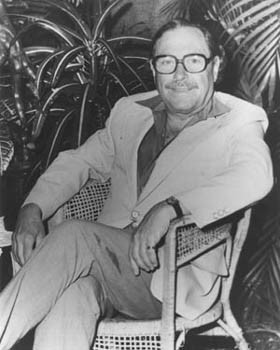Tennessee Williams
Playwright

1911 - 1983
Inducted in 1989
Biography
Tennessee Williams, whose name has been synonymous with American Theater almost since the production of The Glass Menagerie in 1945, adopted Key West as his home in the 1940s and lived off and on there for more than 30 years. Williams won many of his highest honors as a Floridian, including his first Pulitzer Prize for A Streetcar Named Desire in 1947.
Born Thomas Lanier Williams in Columbus, Mississippi in 1911, Williams was the middle child of parents Edwina and Cornelius Williams. Williams had a sister Rose, three years his senior, and a younger brother, Walter Dakin.
From his early childhood, Williams experienced the emotional turmoil of living in a dysfunctional family. His father was a hard-drinking shoe salesman whose travels often kept him away from home, and often violently abusive to his wife and family when he wasn't. Biographers have described Edwina, whose father was an Episcopal rector, as a puritanical, "faded Southern belle" and a "borderline hysteric" who talked incessantly. In 1914, Cornelius moved the family to Clarksdale, Mississippi and then to St. Louis, Missouri, in 1918 where he found work in a shoe factory.
As a child, Williams contracted diphtheria. He coped with this confinement by turning inward, exercising his imagination, reading and eventually writing stories. At age 12, his mother bought him a typewriter. When he turned 16, Williams got his first taste of success as a writer, winning a third place prize (and $5) for an essay that was published in Smart Set magazine.
Aiming for a career in journalism, in 1929 Williams began what would be a long (nine years) college career by enrolling at the University of Missouri. Reportedly, it was here that Williams saw a production of Henrik Ibsen's Ghosts and made up his mind to be a playwright.
For various reasons (including flunking an ROTC course), Williams father ordered him to drop out of school and go to work as a clerk in a shoe store. Williams loathed the work but stuck with it for two years, before suffering a mental breakdown brought on from working all day and writing all night. Sent to Memphis to recuperate, Williams soon joined a community theater group and in 1935 saw the first production of one of his plays, Cairo, Shanghai, Bombay!
Recovered, in 1937 Williams went back to school, this time at the University of Iowa. A year later, having written dozens of plays, he finally took a degree. He also left campus with the nickname "Tennessee," bestowed upon him by fellow students who made fun of his Southern accent.
In 1939, Williams signed on for the federal Works Progress Administration's Art Project, designed to help the nation's arts community survive during the Great Depression. He lived briefly in the French Quarter, discovering new ways to flavor his imagination. The town's unique milieu inspired what would become his most famous work, A Streetcar Named Desire, which opened on Broadway in 1947.
During a brief stint as a script writer for MGM in Hollywood—a surprising find by an agent who befriended him in New Orleans—Williams began work on a largely autobiographical play based on his troubled upbringing. The Glass Menagerie, first opening in Chicago in 1944 and on Broadway the next year, proved to be the turning point in Williams' life. The play was a solid hit, winning the New York Critics Circle Award.
Williams chose Key West as the first place to settle down after his newfound fame. A visitor to the island in 1941, he moved there after Glass debuted on Broadway and lived briefly at the La Concha Hotel, where he is thought to have finished the first draft of another highly personal play, A Streetcar Named Desire, set in New Orleans. In 1949, he bought a home at 1431 Duncan Street, the only residence he would ever own outright.
Streetcar opened in December 1947 at the Ethel Barrymore Theatre on Broadway. Featuring Marlon Brando in the lead male role as Stanley Kowalski, the alcoholic, brutish husband of Stella (played by Kim Hunter). Stella is sister to Blanche DuBois, played by Jessica Tandy. The play powerfully depicts the trauma of domestic abuse aggravated by mental illness, alcoholism and infidelity.
Williams is thought to have based the character of Blanche largely on his sister Rose, who was diagnosed with schizophrenia and other mental disorders when she was in her early 20s. Williams had developed a strong bond with his sister growing up, and he witnessed how her illness tormented both her and her family. But he never forgave his parents for forcing Rose to undergo a prefrontal lobotomy, a now largely discredited treatment that incapacitated her for the rest of her life.
Anguish over his sister's fate, coupled with his own demons, took its toll on Williams' health. He battled depression much of his life, and eventually became addicted to alcohol, sleeping pills and other drugs. From an early age, he wrestled with his homosexuality, only finally coming to peace with the issue in his 60s, and emphatically so with the publication of Memoirs in 1975, an autobiography considered provocative at the time.
Despite his troubles, after the smashing success of Streetcar (the play won the first of his two Pulitzer Prizes), Williams' extraordinary drive to write overrode much of his physical and emotional handicaps and propelled a prolific three-and-a-half decades. From 1947 through 1980, Williams saw 14 of his plays debut on Broadway. He scored big hits with The Rose Tattoo, which won a Tony Award for Best Play in 1951; Cat On a Hot Tin Roof (1955), which won Williams a second Pulitzer, and The Night of the Iguana (1961), which garnered a second Tony. His productivity included two novels, an autobiography and numerous essays, short stories and poems.
More than a dozen of Williams' plays made it to film. A 1964 film version of Iguana, starring Richard Burton, John Huston, Ava Gardner and Deborah Kerr won an Academy Award (for Best Costume Design) and was nominated for two others.
While staying at the Hotel Elysee in New York, in 1983 Williams died, reportedly from choking to death on a bottle cap while trying to take medicine. He is buried at Calvary Cemetery and Mausoleum in St. Louis, Missouri.
Williams' remarkable career is commemorated in innumerable ways today, including three long-running literary festivals held annually in Key West, New Orleans and Clarksdale, Mississippi. As a salute to his 100th birthday, in 2011 dozens of commemorative events were scheduled throughout the U.S. and abroad.

